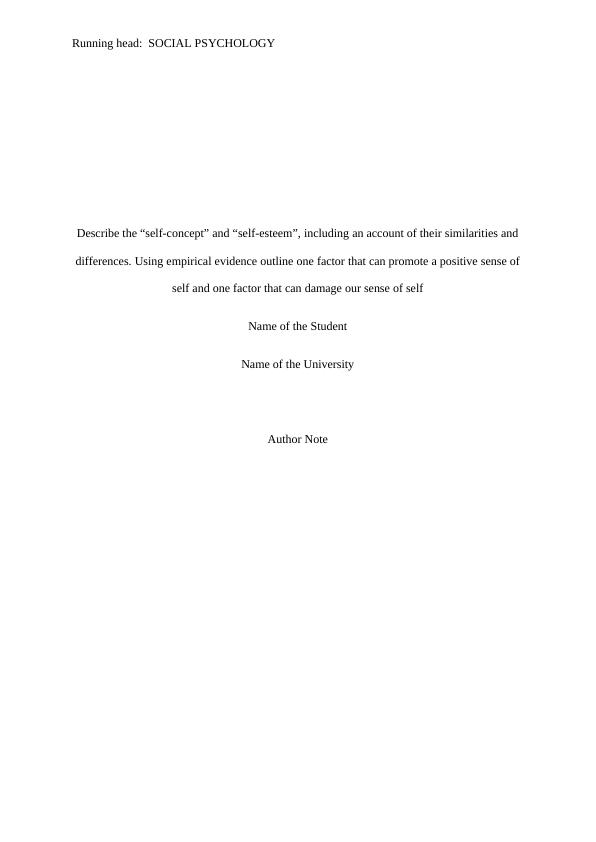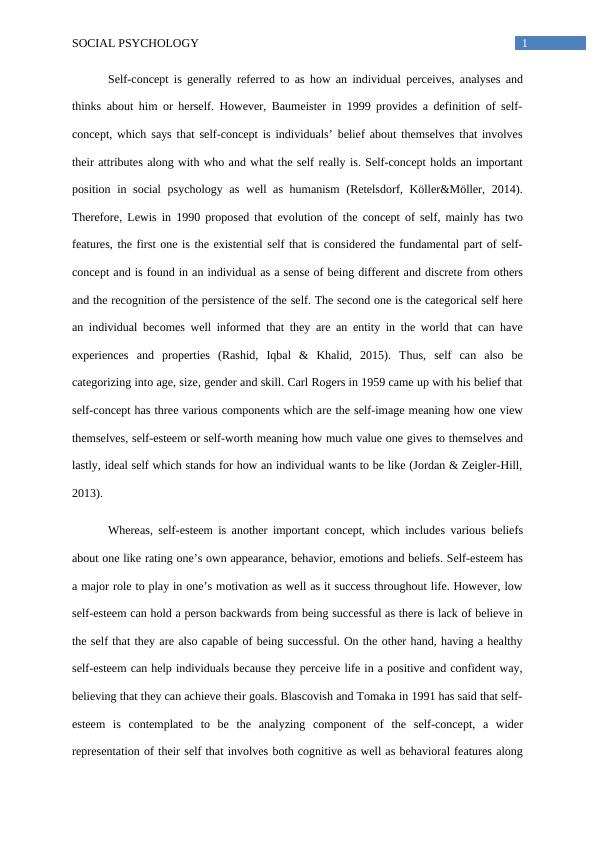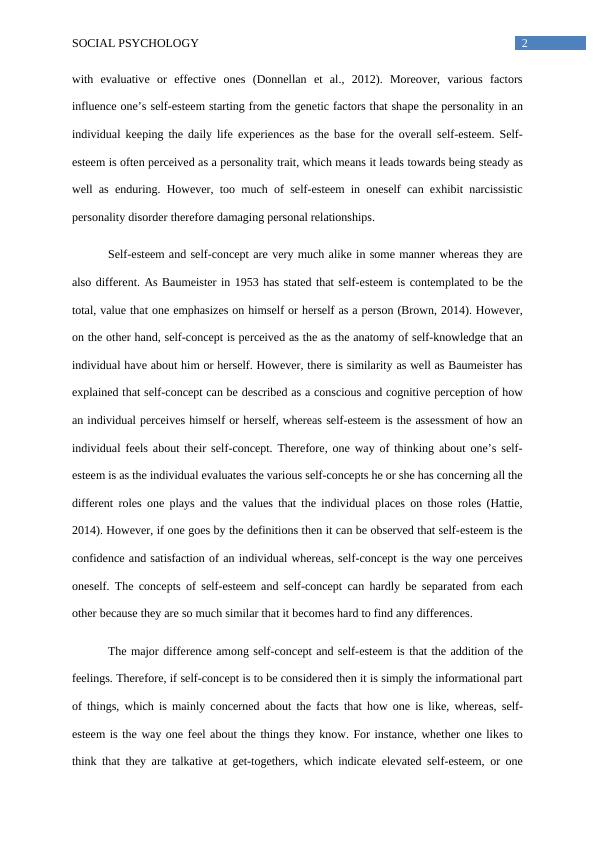Report on Social Psychology
Added on 2020-04-15
8 Pages2193 Words277 Views
Running head: SOCIAL PSYCHOLOGYDescribe the “self-concept” and “self-esteem”, including an account of their similarities anddifferences. Using empirical evidence outline one factor that can promote a positive sense ofself and one factor that can damage our sense of selfName of the StudentName of the UniversityAuthor Note

1SOCIAL PSYCHOLOGYSelf-concept is generally referred to as how an individual perceives, analyses andthinks about him or herself. However, Baumeister in 1999 provides a definition of self-concept, which says that self-concept is individuals’ belief about themselves that involvestheir attributes along with who and what the self really is. Self-concept holds an importantposition in social psychology as well as humanism (Retelsdorf, Köller&Möller, 2014).Therefore, Lewis in 1990 proposed that evolution of the concept of self, mainly has twofeatures, the first one is the existential self that is considered the fundamental part of self-concept and is found in an individual as a sense of being different and discrete from othersand the recognition of the persistence of the self. The second one is the categorical self herean individual becomes well informed that they are an entity in the world that can haveexperiences and properties (Rashid, Iqbal & Khalid, 2015). Thus, self can also becategorizing into age, size, gender and skill. Carl Rogers in 1959 came up with his belief thatself-concept has three various components which are the self-image meaning how one viewthemselves, self-esteem or self-worth meaning how much value one gives to themselves andlastly, ideal self which stands for how an individual wants to be like (Jordan & Zeigler-Hill,2013). Whereas, self-esteem is another important concept, which includes various beliefsabout one like rating one’s own appearance, behavior, emotions and beliefs. Self-esteem hasa major role to play in one’s motivation as well as it success throughout life. However, lowself-esteem can hold a person backwards from being successful as there is lack of believe inthe self that they are also capable of being successful. On the other hand, having a healthyself-esteem can help individuals because they perceive life in a positive and confident way,believing that they can achieve their goals. Blascovish and Tomaka in 1991 has said that self-esteem is contemplated to be the analyzing component of the self-concept, a widerrepresentation of their self that involves both cognitive as well as behavioral features along

2SOCIAL PSYCHOLOGYwith evaluative or effective ones (Donnellan et al., 2012). Moreover, various factorsinfluence one’s self-esteem starting from the genetic factors that shape the personality in anindividual keeping the daily life experiences as the base for the overall self-esteem. Self-esteem is often perceived as a personality trait, which means it leads towards being steady aswell as enduring. However, too much of self-esteem in oneself can exhibit narcissisticpersonality disorder therefore damaging personal relationships. Self-esteem and self-concept are very much alike in some manner whereas they arealso different. As Baumeister in 1953 has stated that self-esteem is contemplated to be thetotal, value that one emphasizes on himself or herself as a person (Brown, 2014). However,on the other hand, self-concept is perceived as the as the anatomy of self-knowledge that anindividual have about him or herself. However, there is similarity as well as Baumeister hasexplained that self-concept can be described as a conscious and cognitive perception of howan individual perceives himself or herself, whereas self-esteem is the assessment of how anindividual feels about their self-concept. Therefore, one way of thinking about one’s self-esteem is as the individual evaluates the various self-concepts he or she has concerning all thedifferent roles one plays and the values that the individual places on those roles (Hattie,2014). However, if one goes by the definitions then it can be observed that self-esteem is theconfidence and satisfaction of an individual whereas, self-concept is the way one perceivesoneself. The concepts of self-esteem and self-concept can hardly be separated from eachother because they are so much similar that it becomes hard to find any differences. The major difference among self-concept and self-esteem is that the addition of thefeelings. Therefore, if self-concept is to be considered then it is simply the informational partof things, which is mainly concerned about the facts that how one is like, whereas, self-esteem is the way one feel about the things they know. For instance, whether one likes tothink that they are talkative at get-togethers, which indicate elevated self-esteem, or one

End of preview
Want to access all the pages? Upload your documents or become a member.
Related Documents
Self and Identity: Understanding Self-Concept and Social Identitylg...
|11
|2565
|119
Reflection on Self and Identity in Social Psychologylg...
|10
|2680
|40
Social Identity Theory | Paperlg...
|16
|5023
|30
Illusion of Control and Personal Beliefslg...
|16
|4174
|51
Research On Borderline And Mental Distress Disorderslg...
|6
|1919
|414
Self-Esteem and Measuring Scalelg...
|7
|1046
|220
